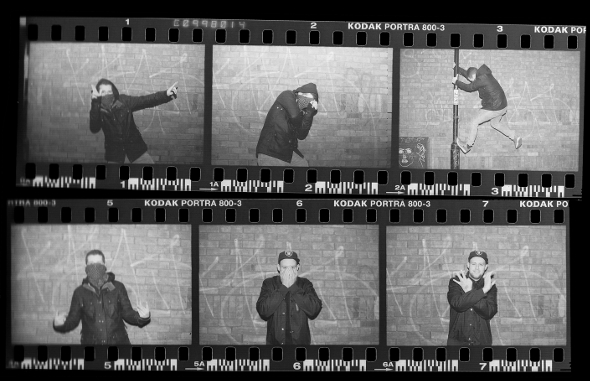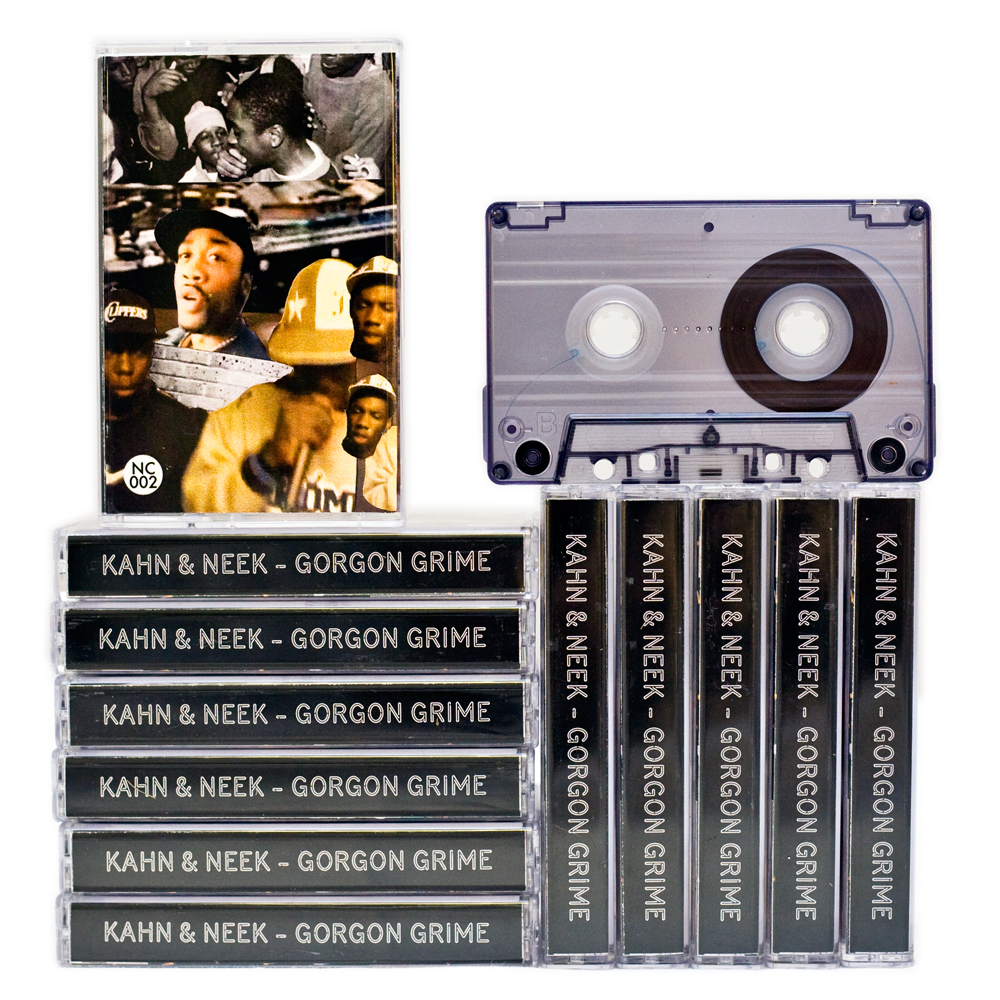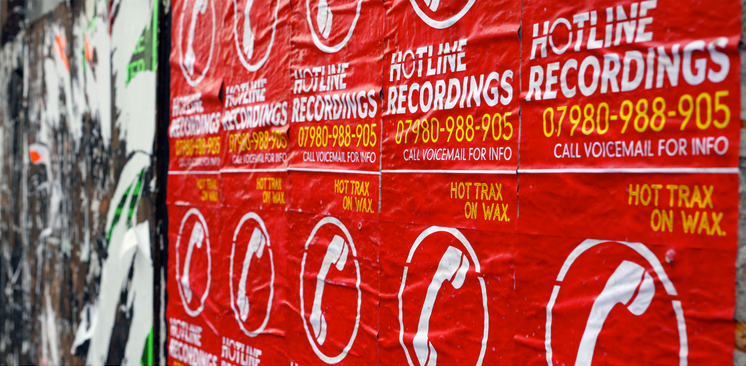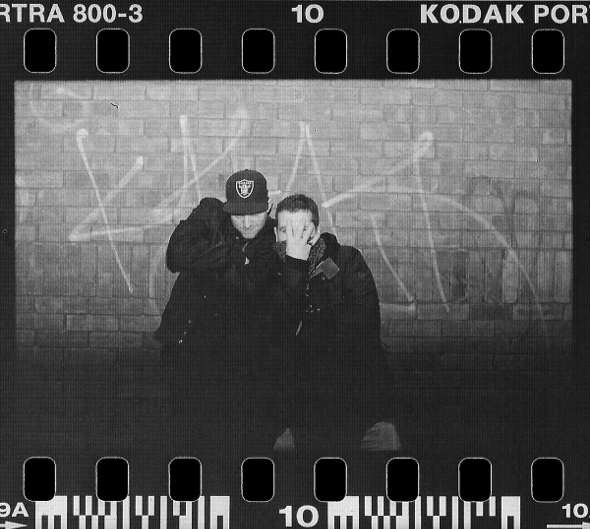Keepers Of The Flame: An interview with Kahn & Neek

Bristol’s Kahn & Neek have been gaining plaudits over the past year for their contemporary take on instrumental grime and reggae. Oli Warwick caught up with the pair to discuss the roots of their projects, vinyl culture, and swapping steak for dubplates.
We live in a time of unprecedented velocity. Information travels at fibre-optic speeds, ideas go global within minutes and styles emerge and dissipate before the download has completed. In music culture, genres once took decades to form, rise, peak, and then trough, with ample time for tributaries of sub-styles, variations and experiments to trickle off and form their own pools of sound. There’s something vital and exciting about the rapidity with which new pockets of electronic music spring up in these times, not least when the results come bolstered with a lasting quality that may hold steady once the hype machine moves on. However, it does get a bit tiring, and sometimes you long for a time-honoured approach that seeks not to break down the latest boundary or reinvent the standard, but simply continue the great legacy of well-matured music.
Joe McGann and Sam Barrett hold fast to the ideal of longevity, rooted deeply in the tradition of their inspirations and looking to uphold the values that shape the music they love. Their reputation has steadily grown from their grime driven output as Kahn and Neek and their steppas project Gorgon Sound. Under his own steam Joe has carved out a healthy name for himself with various strains of bass-driven music for labels such as Idle Hands, Deep Medi Musik and as part of the Young Echo collective, but the collaborative work with Sam has been building a buzz all of its own.
Their partnership formed around The Sureskank Convention, a dubstep and grime night entrenched in their home town of Bristol. “I met Joe a couple of times through some people at college,” Sam recalls, “but he actually hijacked our first ever Sureskank that we did. We had open decks at the end and that’s the first time I saw Joe DJ, and after that we invited him into the fold of our DJs and we started playing out together.”
We’re sat talking in Joe’s studio space in Kings Square, in the same labyrinthine network of rooms that Young Echo host their intermittent radio shows from. To say it’s cosy would be an understatement. The pair are reclined on a sofa that fills the width of the glorified broom cupboard, the dim light of one solitary desk lamp creating something of a clandestine atmosphere. The clamour of various bands rehearsing in adjacent rooms coagulates into a background dirge which seems at odds with the world Joe and Sam operate in.
“After Ruffnek Diskotek and Dubloaded, Sureskank was one of the first dedicated dubstep and grime nights in Bristol,” Joe explains of the party that formed the basis of their collaboration. “There was a whole year I think where Sureskank was the best place to go for grime and that more party style of dubstep in Bristol.”
 The party still happens intermittently now, having been in the vaulted cellar of Cosies in St Pauls and its spiritual home of curious city centre space The Tube, moving around various venues but by and large focusing on more intimate locales. “The idea about Sureskank is to be able to see the DJ really up close,” Sam states. “That’s why we’ve always done it in small places.”
The party still happens intermittently now, having been in the vaulted cellar of Cosies in St Pauls and its spiritual home of curious city centre space The Tube, moving around various venues but by and large focusing on more intimate locales. “The idea about Sureskank is to be able to see the DJ really up close,” Sam states. “That’s why we’ve always done it in small places.”
The list of residents for the party should speak volumes in itself, including such Bristol luminaries as Gemmy, Superisk and B-Lam (better known these days as Young Echo’s El Kid). Meanwhile the guests reflected the nascent days of dubstep when today’s big hitters were more accessible to the smaller promoters, including Kromestar, Tes La Rock, Spyro, Logan Sama and Heny G.
“I built a lot of contacts just through meeting people at events,” Sam reveals as he looks back to the earliest Sureskank parties. “I’d be seeing DJs and saying, ‘can I get your number,’ and literally booking them by phoning them up.”
This informal process of sorting out headliners wasn’t without its pitfalls though, not least once these artists broke through to a wider popularity. Where Sureskank was making savvy bookings based on a few releases that hinted at a new talent, returning to build upon the links forged with those artists relied on mates’ rates and sneaking behind agencies.
“I was running Sureskank down in Brighton as well as in Bristol,” Sam recalls of one such situation while he was studying on the South coast, “and we had booked Chef and Walsh. Chef was doing it dodgy, not through his agent, and obviously he got booked through his agent to play in Sweden or something, rang me the day before, and I was thinking, ‘oh great, you’ve just left me without a headliner!’ I rang up Walsh and was like, ‘mate, what am I meant to do?’ Walsh was the second on the bill, and he said, ‘don’t worry, erm, N-Type’s here. Wait there I’ll just ask him’. You could hear him shouting in the background, ‘N-Type will you do it for a oner?’ and he was like, ‘yeah mate no worries!’”
For all the work put into securing guests, like all the best parties it was still the residents that came to define Sureskank, and it fed a great deal into shaping Joe and Sam as the artists they are today. “The best thing about it was cultivating the actual crew of people,” Joe points out. “It gave us all an opportunity to play out and play what we wanted, and I know certainly for me that was really informative in terms of learning about DJing properly.”
While the events laid some sturdy foundations for the DJ sets Joe and Sam perform now, either individually or as a pair, it can’t be overlooked that the grimier side of their ventures was shaped by Sam’s passion for the genre from an early age. “I used to listen to old Sidewinder tapes,” he reveals. “The older kids on my street used to give me cassettes I just used to dub off. Some of my friends got decks when I was 16, and we all just started buying records.”
Joe’s eyes light up when looking back to the time he spent getting educated after he and Sam started hanging out. “Sam introduced me to a lot of grime,” Joe explains. “I was producing since I was about 16. I had the equipment, but Sam had all the records. I knew all the popular stuff, but going through someone’s record collection and properly listening to things has a different effect.”
Beyond their DJ sets, the first tangible proof of Kahn and Neek’s love affair with grime manifested last year in the Percy/Fierce single, which dropped seismically on their own Bandulu imprint. The release seemed to wilfully tap into a somewhat forgotten culture within electronic music; those mythical white label instrumentals that demonstrated how creative grime was behind the work of the MC. In the guttural, squelching throwdown of “Percy”, the direct, no-messing construction positively whips around the ears, even without the help of the infamous vocal hook from Flowdan.

Similarly, the follow-up single “Backchat”, which emerged on fellow Bristolian imprint Hotline Recordings, captured the immediacy of a heated dancefloor with a similar blend of snagging vocal and simple-but-deadly percussive muscle.
“We made them both in about half an hour each,” Joe says of “Percy” and “Backchat”. “With “Backchat” we were just messing around on Ableton with that vocal looping. As soon as you’ve got something like that, the tune makes itself. That was a dubplate of ours for a year or something. It might not have even come out.”
The lack of pretension in how these tracks came about speaks volumes for their widespread popularity, but equally it buys into the notion that Joe and Sam are more concerned with an instinctive continuation of the music that came before them, rather than some aggrandised appropriation of a style to be reclaimed as their own. It’s a similar ethos that looks set to drive their Bandulu label in the near future, off the back of the runaway success of that first single.
“We’ve got some wicked young producers in Bristol making some really cool stuff,” Joe explains of the next releases they have lined up. “The ethos of it is instrumental grime, simple 8 bar stuff, which surprisingly it doesn’t seem that many people are putting out.”
“We always wanted to just continue that lineage of grime from where it stopped coming out on vinyl,” Sam says of the path Bandulu will take, encapsulating his and Joe’s own grime output in the process. “It was never thinking, ‘we’re gonna be reinventing it’. If we’re out doing a Kahn and Neek grime show, we’re gonna be playing dubplates but we’re also gonna be playing old grime instrumentals, things that might have got missed. B-sides of stuff that we think, ‘oh that was a hidden gem’. We’re still always digging and buying old vinyl.”
“I’d rather cut a dubplate than eat steak for dinner. I can eat pasta for two weeks and I can cut some dubplates.”
It’s evident from the way vinyl creeps into both of their vernacular that the pair are devout wax romantics, which is of course in keeping with the traditions they wish to uphold. However, in their Gorgon Sound guise the sense of ritual and sacrament is even greater. While only one single has surfaced from the project thus far, already Joe and Sam are steadily working their way into a world that operates independently of the trends and fads of the wider dance music scene.
“It was going out to Teachings in Dub and the big reggae events that got me into it,” Joe says of the inspiration behind embarking on a more rootsy, steppas-inspired production tangent. “We obviously both loved reggae since we were really small, but seeing things like Channel One, Iration Steppas, actually involving yourself in the music in that way blew my mind. I started messing around with the idea of doing steppas and Sam was into it as well.”
Bristol is not short of inspiration when it comes to reggae and its derivatives. The soundsystem culture that descends from the Jamaican population has long defined that unique kink in music emanating from the city, and groups such as Dubkasm and Henry & Louis have carried the torch for roots-based music through to the present day. If there’s one exponent of Bristol’s dub and reggae legacy that it’s worth snagging the attention of, it’s Rob Smith (he of Smith & Mighty fame).
“We were basically just making tunes to send to Rob Smith,” Sam admits, thinking back to their first experiments with reggae elements in their dubstep tracks.
“Dubs for Rob,” Joe nods sagely.
It wasn’t until they were booked to play at Dubloaded in October 2010 that Gorgon Sound started to really take hold as a separate entity to the rest of the Kahn and Neek material. With the pressure of an impending gig for Pinch’s flagship bassweight dance, Joe and Sam knuckled down to finishing a raft of tracks and cutting them to dubplate.
“We had lots of tunes pretty much finished, and I think we cut about five or six dubs, so it was about 12 tracks altogether,” explains Sam, “and after that it became a full dubplate DJ operation. We were still playing other records as well at the time, and it’s just evolved since then, into a whole show of our own material.”
It’s a level of commitment that reaches far beyond the convenience of burning off a CD of your latest creation or simply dropping it into your digital platform of choice, and in Bristol perhaps more than other places it represents something of a creative nirvana as a DJ producer (look no further than our recent discussion with Borai for further proof of that). While it may be something of a costly venture, the bar was already raised for the likes of Joe and Sam to step up to.
“If you see someone play a whole dubplate set, that’s quite inspiring. Seeing people like Mala, Pev and Pinch inspired me to do it,” Joe says of their decision to cut dubs. “When you see people just playing dubplates, it sets a standard. I can’t really rock up with a laptop can I? You put the work in and do it properly. It’s a tradition.”
Of course earning the respect of your peers and forefathers is one thing, but it must be considered that a younger generation making their first steps into the clubs now are not necessarily so enamoured with the pomp and ceremony of vinyl.
“I think some kids see it and think, ‘oh why are you bothering with vinyl?’” Sam muses. “We had a guy the other day basically saying I was being pretentious by cutting records and not putting my music on the internet. I said to him, ‘I’d rather cut a dubplate than eat steak for dinner. I can eat pasta for two weeks and I can cut some dubplates. He just said, ‘why don’t you get Serato?’”
 With both the Kahn & Neek releases, and the Gorgon Sound material, there have been backlashes to the popularity of the music with its vinyl-only mandate, not least in the grime scene which has arguably moved on from being a primarily vinyl-focused genre. For Joe and Sam though, the way their music is presented, both in terms of releases and their shows, is simply a continuation of a long-standing tradition within DJ culture.
With both the Kahn & Neek releases, and the Gorgon Sound material, there have been backlashes to the popularity of the music with its vinyl-only mandate, not least in the grime scene which has arguably moved on from being a primarily vinyl-focused genre. For Joe and Sam though, the way their music is presented, both in terms of releases and their shows, is simply a continuation of a long-standing tradition within DJ culture.
“Some people have a sense of entitlement, they don’t understand,” Joe bemoans of those that consistently call for their music to be released digitally. “They get frustrated by exclusivity with music, but nowadays it’s so hard to keep hold of a bit mystery for longer than a week. It’s not like us saying, ‘oh no you can’t have it’. It’s for DJs that are taking it seriously. If we put the work in doing our bit, buying records, digging, then we want to be part of that tradition, not the tradition of ‘here’s 30 tunes for free’.”
In the draining pace of the online music world, it’s hard to disagree that the glut of availability struggles to match the significance of a new record you can hold in your hands and put on your shelf. After all, thirty tunes given away for nothing does not say much about the worth the artists themselves put on the music. Beyond notions of value, there is also the endless feeling of transience as another deluge of downloads, uploads, streams and shares waits in the wings for another musical phase to take hold.
“I think what attracts me to steppas is the absence of trend,” Joe muses, “and it’s a slower building thing. You see the big guys, they’ve been doing it for twenty odd years. It’s a long game, but you’ve got to earn your respect really.”
“In dubstep people can be around for six months and can be a flash in the pan,” Sam adds. “That’s what I really like about the reggae scene. You keep working at it and you put out your records, you do your shows and you build up a fanbase.”
Aside from the music they make and release, Joe and Sam are equally conscious to have a physical presence that can stand the test of the time, and so they’re channelling some of their considerable creative energy into the Roots Radical Soundsystem. Being built by Bristol’s resident fixer of all things audio-related, Beavis, it’s a slow-burning labour of love that reflects the nature of the reggae scene as a whole.
“We’ve built some dubplates for him and put money into the system as well,” Joe explains of their involvement with the system. “Beavis has been working on that system since he was sixteen, and that is going to take time to build and build and build. In twenty years time we’ll hopefully have our own soundsystem and be still doing reggae dances. That’s the way that world works.”
It’s a reassuring vision of the future, where music that matters now can live on and resist the tides of hype. With their strongly grounded principles and consideration for the way their message is spread, it’s safe to assume that Joe and Sam, whether as Kahn and Neek or Gorgon Sound, will be around for a long while yet.
Interview by Oli Warwick
Photography courtesy of Alex Digard
Gorgon Grime artwork courtesy of Tape Echo